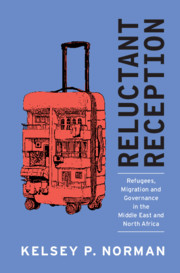Book contents
- Reluctant Reception
- Reluctant Reception
- Copyright page
- Dedication
- Epigraph
- Contents
- Figures
- Tables
- Acronyms
- Note on Translation
- Preface
- 1 Introduction
- 2 Host State Engagement in the Middle East and North Africa
- 3 Egypt
- 4 Morocco
- 5 Turkey
- 6 Differential Treatment by Nationality?
- 7 The Domestic Influence of International Actors
- 8 The Post-2015 Migration Paradigm in the Mediterranean
- 9 Conclusion and Avenues Forward
- Book part
- Notes
- References
- Index
1 - Introduction
Migration in the Global North and South
Published online by Cambridge University Press: 26 November 2020
- Reluctant Reception
- Reluctant Reception
- Copyright page
- Dedication
- Epigraph
- Contents
- Figures
- Tables
- Acronyms
- Note on Translation
- Preface
- 1 Introduction
- 2 Host State Engagement in the Middle East and North Africa
- 3 Egypt
- 4 Morocco
- 5 Turkey
- 6 Differential Treatment by Nationality?
- 7 The Domestic Influence of International Actors
- 8 The Post-2015 Migration Paradigm in the Mediterranean
- 9 Conclusion and Avenues Forward
- Book part
- Notes
- References
- Index
Summary
The book begins with the stories of Sama, Abdou, and Ibrahim, three individuals residing semi-permanently in Egypt, Morocco, and Turkey, respectively. What Sama, Abdou, and Ibrahim have in common is that they are ‘stuck’ in countries thought to only be spaces of transit. Many migrants and refugees come to countries like Morocco, Turkey and Egypt intending to pass through on their way to Europe or other Western states, when in reality it is only a small fraction that successfully do. The majority of migrants and refugees find themselves lingering, perhaps indefinitely, in transit states that are rapidly becoming countries of migrant and refuge settlement. The chapter discusses assumptions embedded within the extant literature on migration to countries in the Global South that have prevented us from adequately understanding this phenomenon and presents the central argument: that Global South host states are strategic actors capable of choosing the migration and refugee policies that best fit their strategic aims. The chapter also describes the methods for case selection, data collection and analysis, and provides a roadmap for the rest of the book.
- Type
- Chapter
- Information
- Reluctant ReceptionRefugees, Migration and Governance in the Middle East and North Africa, pp. 1 - 20Publisher: Cambridge University PressPrint publication year: 2020

